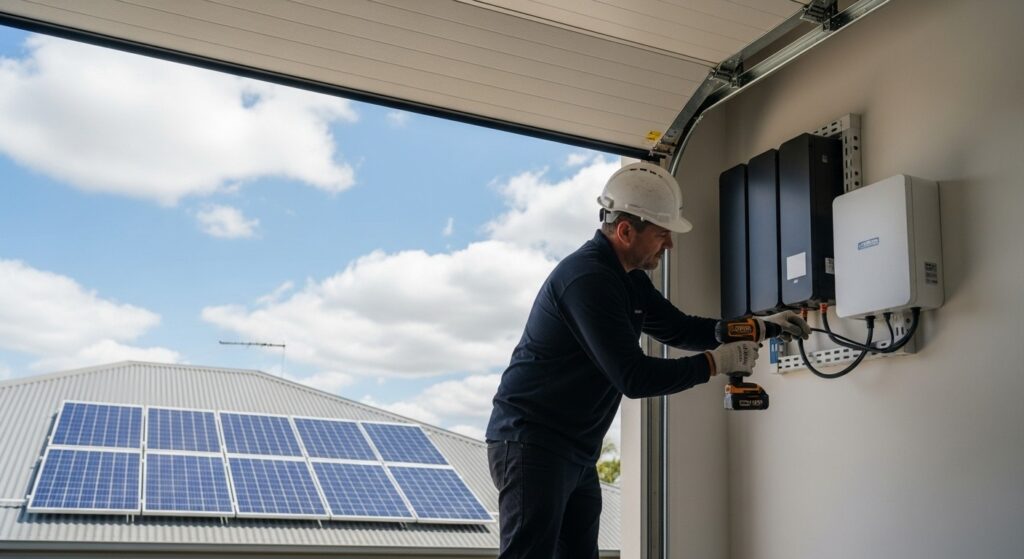As more Australians turn to renewable energy solutions, solar power is becoming a top choice for homeowners and businesses alike. The ability to harness the sun’s energy is an excellent way to reduce electricity bills and minimize one’s carbon footprint. However, a critical component that enhances solar energy systems is the solar battery. A solar battery stores excess energy generated during the day for use at night or during periods of high electricity demand, ensuring energy availability around the clock. Solar panels gold coast australia are a perfect match for this technology, given the region’s abundant sunshine. But how much do solar batteries cost, and what factors influence their price?
In this article, we will explore the costs associated with solar batteries, the key components of a solar battery system, and factors that affect pricing. We will also discuss the financial benefits and government incentives that make solar batteries an attractive investment, particularly in sunny regions like the Gold Coast.
What Are Solar Batteries?
A solar battery is a storage device that stores excess energy generated by solar panels. Typically, when your solar panels generate more energy than your home consumes during the day, the excess power is sent to the grid. With a solar battery, that extra power is stored for later use, allowing you to use solar energy at night or during cloudy weather when your panels aren’t generating electricity.
There are several types of solar batteries, but the most common are lithium-ion and lead-acid batteries. Lithium-ion batteries are preferred for residential solar systems due to their higher efficiency, longer lifespan, and smaller size. The technology is similar to that used in electric vehicles, making it an increasingly popular choice for home energy storage.
How Much Do Solar Batteries Cost?
The cost of solar batteries can vary significantly depending on factors such as battery size, type, and brand. The price is generally calculated based on capacity (measured in kilowatt-hours or kWh) and ranges from $900 to $2,000 per kWh for residential installations. For a typical household, the cost of a solar battery system can range between $9,000 to $20,000 or more, including installation.
Here is an overview of the estimated costs based on battery capacity:
- 5 kWh battery: Typically costs between $5,000 and $7,000.
- 10 kWh battery: Typically costs between $8,000 and $12,000.
- 15 kWh battery: Typically costs between $12,000 and $18,000.
These prices include the battery unit, the inverter (which converts the DC electricity from the battery into AC power used in your home), and installation costs. However, additional expenses may arise based on your home’s existing solar system setup, location, and specific installation requirements.
Factors That Affect the Cost of Solar Batteries
Several factors influence the price of a solar battery system. Let’s take a closer look at these factors:
1. Battery Type
The type of battery you choose plays a significant role in determining the price. The two main types of batteries used in residential solar systems are lithium-ion batteries and lead-acid batteries.
- Lithium-ion Batteries: These are more expensive but offer better efficiency, longer life (typically 10-15 years), and a higher energy density. Lithium-ion batteries are compact and require less maintenance. Popular brands include Tesla Powerwall, LG Chem, and Sonnen.
- Lead-Acid Batteries: Lead-acid batteries are cheaper but less efficient than lithium-ion batteries. They have a shorter lifespan (usually 5-7 years) and are larger in size. However, they still provide a cost-effective solution for certain applications and are often used in off-grid systems.
2. Battery Capacity
The size of the battery system, measured in kilowatt-hours (kWh), is another factor that affects its cost. The larger the capacity, the more expensive the battery. Larger systems can store more energy, which is beneficial if you consume more power or want to ensure you have enough energy during power outages or at night. For example, a 5 kWh battery may be sufficient for a small household, while a larger home with higher energy needs might require a 10 kWh or 15 kWh battery.
- 5 kWh battery: Suitable for small to medium-sized homes with moderate energy needs.
- 10 kWh battery: Ideal for larger households or those who wish to store more energy for later use.
- 15 kWh battery: Best for homes with high energy consumption or those looking for backup power for long periods.
3. Brand and Quality
The brand of the battery system also affects the price. Well-established brands like Tesla, LG Chem, and Sonnen generally offer high-quality batteries with longer warranties and better performance guarantees, but these products can be more expensive. On the other hand, lesser-known brands may offer lower prices, but they may come with shorter warranties or less reliable performance.
4. Installation Costs
Installation costs are another factor that can influence the total price of a solar battery system. These costs can vary depending on the complexity of the installation, the size of the system, and your location. In Australia, installation costs typically range between $1,000 and $3,000. If your home already has solar panels installed, the installation of a battery might be straightforward. However, if you are installing a battery as part of a new system, additional wiring and configuration may be required.
5. Government Incentives and Rebates
Government incentives and rebates can significantly reduce the cost of installing solar batteries. In Australia, there are various federal and state-level rebates available to make solar batteries more affordable for homeowners.
For instance, the Small-scale Renewable Energy Scheme (SRES) provides rebates for solar panel and battery installations. Homeowners may receive rebates of up to $345 per kWh of battery storage capacity, depending on the system’s size and location. Additionally, Queensland residents may be eligible for state-specific incentives that can lower the upfront cost of solar battery systems.
Financial Benefits of Solar Batteries
While the upfront cost of a solar battery system can be significant, the long-term financial benefits make it a worthwhile investment. Solar batteries help homeowners reduce their reliance on the grid, which can lead to substantial savings on electricity bills.
1. Lower Electricity Bills
By storing excess energy generated during the day, you can use it at night or during periods of high electricity demand, thus reducing your reliance on grid power. In the Gold Coast, where electricity prices can be high, this can result in significant savings. A solar battery allows you to maximize the use of your solar power, especially during peak pricing hours, reducing your overall energy costs.
2. Energy Independence
Solar batteries provide homeowners with greater energy independence. By generating and storing your own electricity, you become less reliant on the grid, which can be particularly beneficial during power outages or times of high electricity demand. If you experience frequent power outages in your area, a solar battery can provide peace of mind, as it allows you to continue using your appliances without interruption.
3. Return on Investment (ROI)
The return on investment for solar batteries typically ranges from 3 to 7 years, depending on your location, electricity consumption, and energy savings. With the right system, you can start seeing significant savings on your electricity bills, making the initial investment pay off over time.
In regions like the Gold Coast, where sunlight is abundant and electricity costs are high, the ROI for solar battery systems can be faster. Over the lifespan of the battery, which can be 10-15 years, the savings on electricity bills can add up significantly.
4. Increased Property Value
Homes with solar power systems, especially those with batteries, tend to have higher resale values. Buyers are increasingly looking for homes with energy-efficient features, and a solar system with battery storage is an attractive selling point. In the long run, installing solar batteries not only saves you money on energy costs but also increases the marketability of your property.
Conclusion
The cost of solar batteries can vary depending on the size of the system, battery type, and installation requirements, but the long-term financial benefits make them a smart investment. With government incentives and rebates available in Australia, the upfront cost of installing a solar battery system has become more affordable.
For homeowners in the Gold Coast, solar panels gold coast australia are a great way to maximize energy production, and adding a solar battery can help ensure energy savings throughout the day and night. With advancements in solar technology and increasing support from government incentives, now is a great time to invest in solar batteries.
By choosing a solar battery, you are making a step towards energy independence, lowering your electricity bills, and contributing to a greener environment. Whether you’re looking for backup power, increased efficiency, or long-term savings, solar batteries are an excellent addition to any solar power system.






